← Back to Reviews
in
Metropolis (Fritz Lang, 1927) Classic Rating:
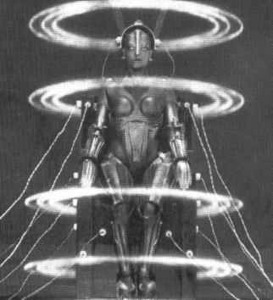
I finally got around to watching this again, this time with Sarah. I'm glad I did. If you have the time and just let it wash over you (preferably the restored version with clean, clear subritles), it moves along very quickly. On the other hand, it does seem to cram in a whole lotta plot into one film, but somehow it mostly resolves itself at the end.
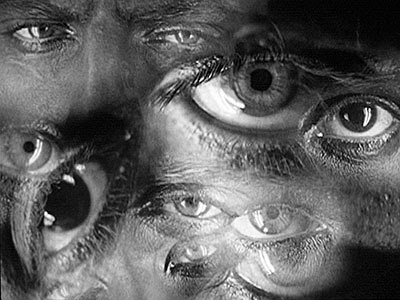
First off, the main reasons for watching Metropolis are the super sets, special effects and all the elements of the production design. Sometimes the camerawork appears hand-held, especially in closeups of some of the "action scenes". Then again, much as his fellow countryman F.W. Murnau did in his American film Sunrise (also 1927), Lang uses all kinds of photo and editing trickery to incorporate paranoia and disorientation; one of my fave of these is the shot of all the eyes superimposed together when the rich young men of the upper world are seduced by the "robotic" Maria and begin to fight and kill each other over her and her charms. That eye shot certainly reminded me of some of Dali's later work in films. There are so many spectacular shots, sets and effects that one could write a book detailing the creation and subliminal effect of each one, but this is not the place for that, although it would be interesting to hear some of other viewer's favorite visual flourishes.
As far as plot points go, maybe I can list a few and see what people think of each one and how they may help/hinder the overall film and what it's trying to accomplish.

1. Metropolis is a huge city where the rich and powerful have a wonderful life consisting mostly of modern technology and entertainment while the workers live underground as almost slaves and never even see the light of day. What I would like to know is whether Metropolis is supposed to be representative of an entire futuristic world, an anomoly or something parents tell their children as a bedtime story beginning with "Once upon a time... ".
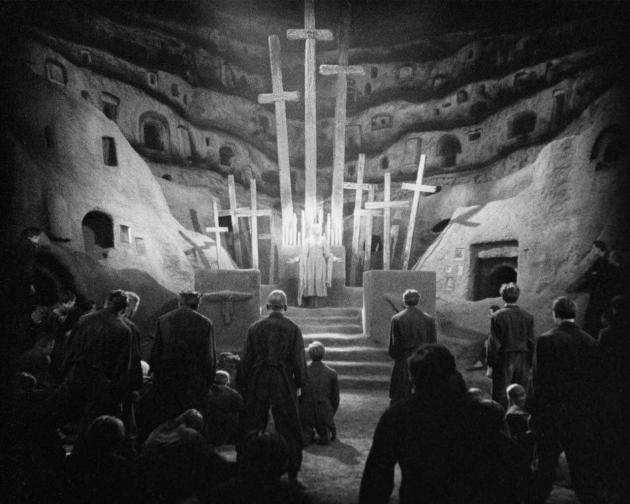
2. There is a saintly woman named Maria (Brigitte Helm) who tries to pick up the spirits of the workers by telling them that a Mediator will come one day to reconcile the Hands (the workers) with the Head [the founder of Metropolis, Joh Frederson (Alfred Abel)]. Maria speaks to people in front of a group of crosses and attracts Joh's son Freder (Gustav Fröhlich) who decides that he could be the Mediator. I'm not especially up on my German, but Joh sure seems like John, so we could have the characters of John and Mary somehow coming together to "create" a Mediator named Freder, which sounds a lot like "Freedom".
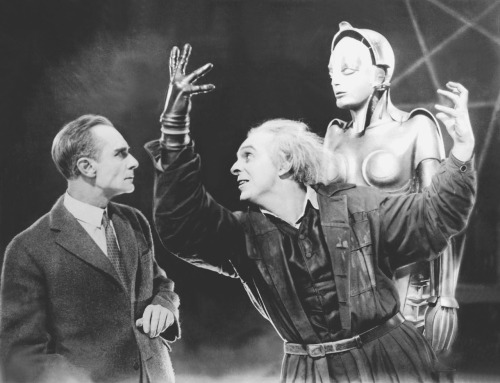
3. Joh has a rival in the character of a "mad scientist" named Rotwang (Rudolf Klein-Rogge, Dr. Mabuse himself). The scientist seems similar to both Dr. Frankenstein and Dr. Strangelove. The reason Rotwang and Joh are rivals dates back to the fact that they both loved the same woman, Hel, who married Joh but died giving birth to Freder. Rotwang invents a robot which can appear human and kidnaps Maria to turn this robot into a Maria who will incite the masses.

4. The world of the workers and the way in which Joh interracts with it seems to have also inspired Charles Chaplin's use of technology and class struggle in Modern Times. I even see a strong resemblance between the appearance of the leader of Chaplin's factory and Joh Frederson. This also brings me to the concept of how the technology works in the utopian upper part of the city. Near the end, after the workers have destroyed the heart machine and power is shut off above ground, we see all the ground transportation piled up in what appears to be a freeway. We also see none of the planes and other flying vehicles in the air. This implies that all modes of transportation above ground run due to the Heart Machine and not due to something resembling gasoline.

5. The final third of the film turns into something resembling a disaster flick when the bottom levels flood and all the workers' children have to be saved by Freder, Maria and Josaphat (Theodor Loos), a man in the employ of Joh who is also Freder's good friend. Ultimately, it turns the entire film into a story about Family and how all the characters seem to believe that it's the most important thing in their lives, even if they'd occasionally rather wreak destruction, burn "witches" and have wild dancing revels while doing so.

6. I've left out many other points which almost seem superfluous but are included in the film. These include the relationship of 11811 [Georgy] (Erwin Biswanger), a worker, with Freder, and the way the Thin Man (Fritz Rasp) spies on Freder and intercepts Georgy. Both the characters of Georgy and the Thin Man were previously only discussed in intertitles because they were part of the lost footage, but now with the restoration, what they have to do with the film is much clearer. They may be incidental characters but they help to flesh out themes of friendship and mistrust.
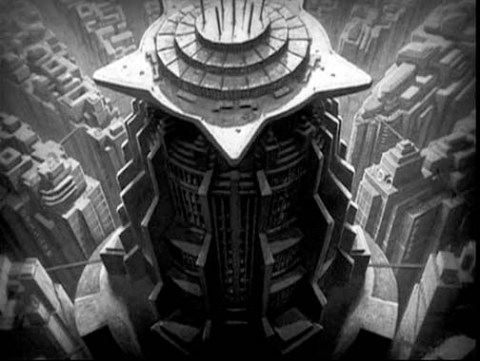

Metropolis and Blade Runner
I realize that this is a superficial summary of some of the content of Metropolis, but I'm going to leave it at this for now since I'm still waiting for others to discuss it in more detailed or specific terms.

I finally got around to watching this again, this time with Sarah. I'm glad I did. If you have the time and just let it wash over you (preferably the restored version with clean, clear subritles), it moves along very quickly. On the other hand, it does seem to cram in a whole lotta plot into one film, but somehow it mostly resolves itself at the end.

First off, the main reasons for watching Metropolis are the super sets, special effects and all the elements of the production design. Sometimes the camerawork appears hand-held, especially in closeups of some of the "action scenes". Then again, much as his fellow countryman F.W. Murnau did in his American film Sunrise (also 1927), Lang uses all kinds of photo and editing trickery to incorporate paranoia and disorientation; one of my fave of these is the shot of all the eyes superimposed together when the rich young men of the upper world are seduced by the "robotic" Maria and begin to fight and kill each other over her and her charms. That eye shot certainly reminded me of some of Dali's later work in films. There are so many spectacular shots, sets and effects that one could write a book detailing the creation and subliminal effect of each one, but this is not the place for that, although it would be interesting to hear some of other viewer's favorite visual flourishes.
As far as plot points go, maybe I can list a few and see what people think of each one and how they may help/hinder the overall film and what it's trying to accomplish.

1. Metropolis is a huge city where the rich and powerful have a wonderful life consisting mostly of modern technology and entertainment while the workers live underground as almost slaves and never even see the light of day. What I would like to know is whether Metropolis is supposed to be representative of an entire futuristic world, an anomoly or something parents tell their children as a bedtime story beginning with "Once upon a time... ".

2. There is a saintly woman named Maria (Brigitte Helm) who tries to pick up the spirits of the workers by telling them that a Mediator will come one day to reconcile the Hands (the workers) with the Head [the founder of Metropolis, Joh Frederson (Alfred Abel)]. Maria speaks to people in front of a group of crosses and attracts Joh's son Freder (Gustav Fröhlich) who decides that he could be the Mediator. I'm not especially up on my German, but Joh sure seems like John, so we could have the characters of John and Mary somehow coming together to "create" a Mediator named Freder, which sounds a lot like "Freedom".

3. Joh has a rival in the character of a "mad scientist" named Rotwang (Rudolf Klein-Rogge, Dr. Mabuse himself). The scientist seems similar to both Dr. Frankenstein and Dr. Strangelove. The reason Rotwang and Joh are rivals dates back to the fact that they both loved the same woman, Hel, who married Joh but died giving birth to Freder. Rotwang invents a robot which can appear human and kidnaps Maria to turn this robot into a Maria who will incite the masses.

4. The world of the workers and the way in which Joh interracts with it seems to have also inspired Charles Chaplin's use of technology and class struggle in Modern Times. I even see a strong resemblance between the appearance of the leader of Chaplin's factory and Joh Frederson. This also brings me to the concept of how the technology works in the utopian upper part of the city. Near the end, after the workers have destroyed the heart machine and power is shut off above ground, we see all the ground transportation piled up in what appears to be a freeway. We also see none of the planes and other flying vehicles in the air. This implies that all modes of transportation above ground run due to the Heart Machine and not due to something resembling gasoline.

5. The final third of the film turns into something resembling a disaster flick when the bottom levels flood and all the workers' children have to be saved by Freder, Maria and Josaphat (Theodor Loos), a man in the employ of Joh who is also Freder's good friend. Ultimately, it turns the entire film into a story about Family and how all the characters seem to believe that it's the most important thing in their lives, even if they'd occasionally rather wreak destruction, burn "witches" and have wild dancing revels while doing so.

6. I've left out many other points which almost seem superfluous but are included in the film. These include the relationship of 11811 [Georgy] (Erwin Biswanger), a worker, with Freder, and the way the Thin Man (Fritz Rasp) spies on Freder and intercepts Georgy. Both the characters of Georgy and the Thin Man were previously only discussed in intertitles because they were part of the lost footage, but now with the restoration, what they have to do with the film is much clearer. They may be incidental characters but they help to flesh out themes of friendship and mistrust.


Metropolis and Blade Runner
I realize that this is a superficial summary of some of the content of Metropolis, but I'm going to leave it at this for now since I'm still waiting for others to discuss it in more detailed or specific terms.
